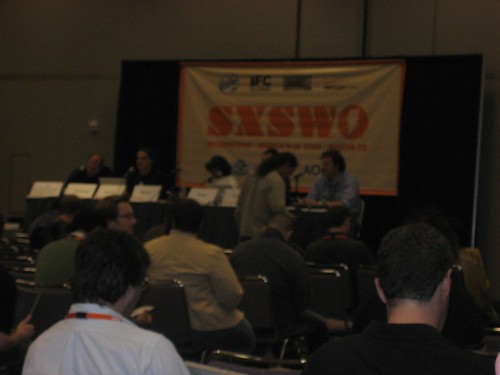Open Content, Remix Culture and the Sharing Economy: Rights, Ownership and Getting Paid
Moderator: Eric Steuer, Creative Dir – Creative Commons
Eric Steuer, Creative Dir – Creative Commons
Glenn Otis Brown, Products Counsel – YouTube
John Buckman, Founder and CEO – Magnatune
Laurie Racine, Eyespot and DotSub
Max Schorr, Publisher & Founding Ed – GOOD magazine

Rough Panel Notes:
magnatune – can use their tunes if you’re not making any money for it. If you are going to make money, they can then get a license for the music. Over a thousand films have gotten a license from them. Lonelygirl15 uses them. Youtube uses them. Helping out people that don’t have any money to launch a career.
Blair Witch Project avoided distribution with “the strand” a new episodic film/DVD – they used magnatune. Star-rek – mash-up of star trek and babylon 5. got a deal with paramount.
how do big companies use content without exploiting participants? Some companies are allowing people to use their content with/out paying if there’s some way for them to get paid.
producers/artists
distributors
services like youtube
end users
two parallel paths from big companies:
attract audiences by creating vehicles
allowing remix of their own content with their own content
Good magazine – uses a creative common license for all of their authors – create a situation wehre the authors have control of their own work.
Emerging models:
music world – license rather than give rights away.
film world – revver (free, with commercial) independent film level content.
Poddio books – authors read their own books – chapters letting people try.
letting the people who have no money use your product anyway at a lesser quality. Straddling the world of free and pay in ways they otherwise wouldn’t.
People really want their money to go to things they believe in. – people want to pay musicians.
eyespot – for film makers – put up your stuff and let people remix it, marketing yourself.
How do I break into the big industry? That’s not the right approach – avoid the big industry, and go to other people who are also trying to break in: let your music be used in indie films, etc.
Small masterpieces – everyone can make them and distributed them. Indie film makers are often aiming at vertical audiences that no one is yet speaking to.
Broad Way – stories of people on the street in new york. beginning of yearly look at the stories of new york. Free/remix culture.
creative commons license – allows you freedoms that big business doesn’t – makes people want to give you something back.
writers usually give up rights – creative commons gives some back to them.
documentarians dilemma – having access to other people’s footage vs. letting others have access to yours. Creative commons lets the relationships be clear.
Non-commercial use drives commercial use by greater distribution, then they have to upgrade their license.
Business development – easier to do without having to hire lawyers. DMCA – puts the onus of responsibility on the copyright owner to notify when a copyright isn’t for use. Youtube is something that the public wants – not practical to police all the content, so they let it wait for someone to contact them.
Can’t refer to all big media as an single entity. Some are working in partnership with youtube. It’s not a single-minded industry.
People go through use agreements line by line – that can be really bad for big businesses. Creative commons makes it easier for people to understand.
Can’t demand that businesses are open – they would have a backlash against it. Can ask for transparency from companies, though.
On some license agreements – there’s an easily readble vs. legalese versions in CC, and google is trying this, too.
What does non-commercial use mean? You have to spell things out, which is why agreements are so long.